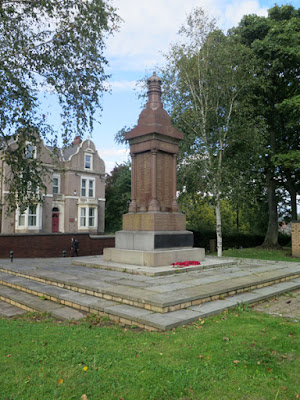 |
| Mexborough Rock at an old quarry on Bank Street |
Leaving St. John’s church, I continued my afternoon in Mexborough by walking up Church Street until I reached Doncaster Road, where I turned sharply to the left and headed back towards the town centre. Here, Clayfield Road led to the site of the former Coalfield Brick Works, which was sited on the mudstone above the Mexborough Rock.
I crossed the road to the entrance to Castle Hills Park, where there are the well preserved remains of the motte and bailey castle built by Roger de Busli not long after the Norman Conquest in 1066 – in addition to those at Tickhill, Laughton-en-le-Morthen and Kimberworth in South Yorkshire.
Although in the C17 there was a reference to stone in the top of the motte, suggesting perhaps that a stone tower was built on it, apart from the large stones now used for landscaping in the park, there is no masonry to be seen.
Having looked at the principal features, I returned to the entrance to look at the relocated sandstone memorial to sapper William Hackett, a recipient of the Victoria Cross who died while rescuing colleagues trapped in the collapsed tunnel that they were digging during WWI.
Next to this is the unlisted Mexborough war memorial, which was unveiled in 1922 and comprises a simple pillar with four columns made out of a dark red granite, which may be from the Ross of Mull in Scotland. This is set on a two stepped plinth, with grey granite and medium grained Carboniferous sandstone used for the upper and lower sections respectively.
Continuing along Doncaster Road to the Adwick roundabout, looking to the south there is a good view of a small but distinctive angular landform known as Peas Hills Plantation, where a small outlier of Mexborough Rock is separated from the main body of the escarpment to the south-west of Old Denaby by faulting.
Having crossed the road at the roundabout, at the beginning of Bank Street I glimpsed an exposure of Mexborough Rock that is a remnant of a face of one of the old quarries in this area, which is now occupied by Dazzle Hair Design and the adjoining Spiritualist church.
The exposure has an orange massive sandstone full of fractures at its base, with grey/light brown thinner sandstones and siltstones overlying it. None of these would be suitable for building stone and suggests that the quarry took advantage of the easy access on the escarpment for local use, but the limit of good stone was soon reached and led to its closure.
On one side of the car park where the rock is exposed, there is a coursed rubble wall built out of what I would describe as typical Rotherham Red sandstone. With stone abundant in the vicinity, it seems strange that this red variety of Mexborough Rock has been used for such an insignificant structure, especially when the nearest unknown source would possibly be the same used to supply Hooton Roberts, which is 2 miles to the south as the crow flies.









No comments:
Post a Comment